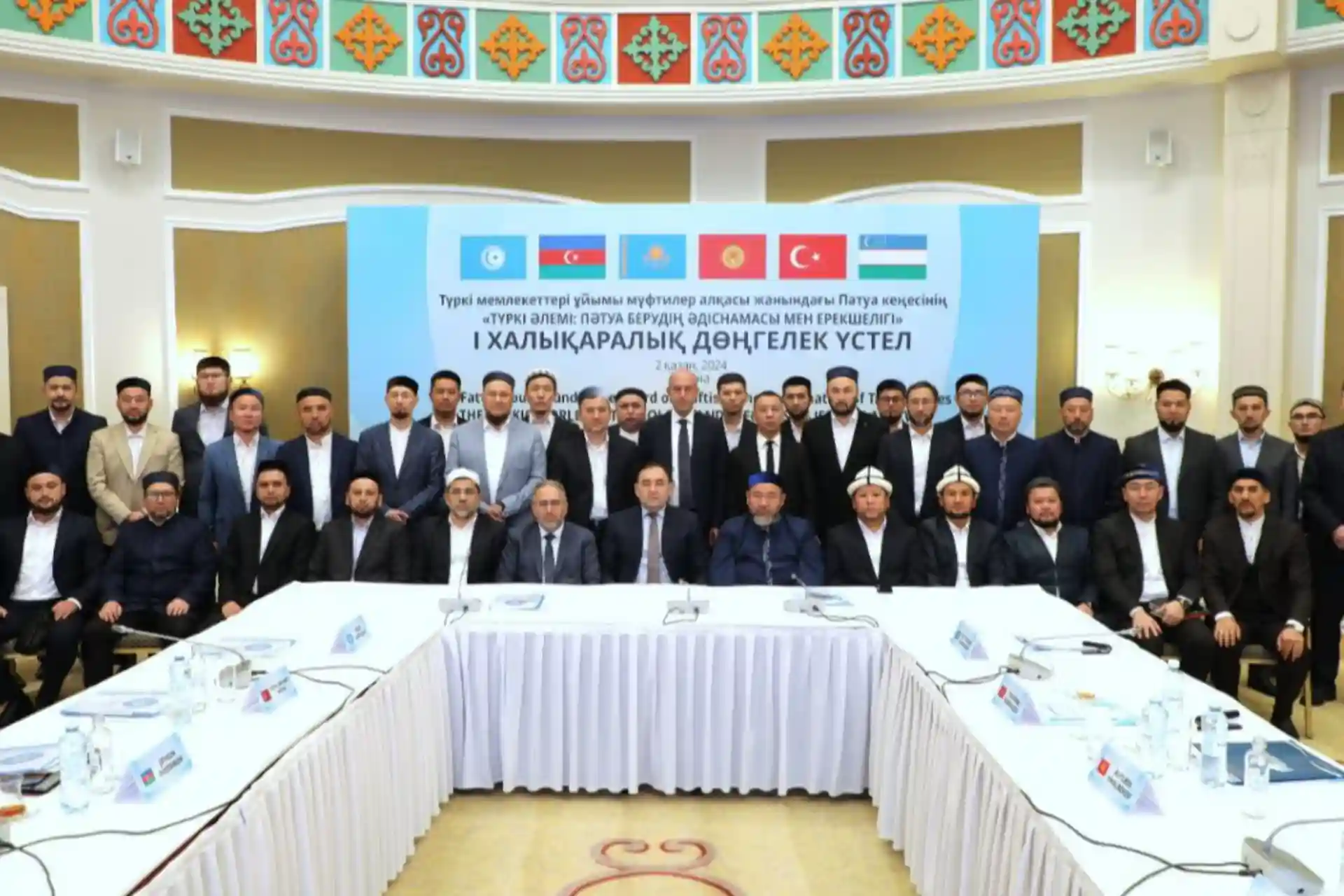The family crisis is increasing in Turkey, what is the reason for this?
In Turkey, under the pretext of fighting for women's rights and gender equality, the attack on the position of men in the family creates new problems and conflicts. In particular, the "Istanbul Convention" signed in May 2011 brought the decline of the family to the highest level. Efforts based on a long-term carefully developed plan have not failed to bear their "fruits" - today the age of marriage and childbearing in Turkish society has increased, the number of marriages has decreased, and divorces have increased. So is there a solution?
The history of the family crisis in Turkey is directly related to the period of the administration of Mustafa Kemal Atatürk, and the process of secularization of the state weakened the role of Islam in the life of society. This caused the existing family values to gradually break down.
Especially among Turks, under the pretext of fighting for women's rights and gender equality, the attack on the position of men in the family has created new problems and conflicts.
The forces interested in the introduction of Western life in the Muslim country considered the family values derived from the traditions, history and religion of the Turkish people as the main threat to gender equality. They began to emphasize that "the discrimination of women cannot be stopped without losing the religious traditions in which women are seen only as 'mothers' and 'housewives'."
Education and economy played a decisive role in the implementation of this policy. The education system was focused on changing the mindset of the next generation. In addition, cartoons depicting men doing jobs such as changing diapers, cleaning windows, and cooking, while girls are depicted as construction workers or truck drivers, are also part of this propaganda. The question arises: will equality be achieved if young girls become men's hairdressers or construction workers, if boys change diapers or do other feminine jobs?
Some of the successes of EU mainstream policy "equality" promotion in Turkey include CEDAW (Convention on the Elimination of All Forms of Discrimination Against Women) and Istanbul Convention (Council of Europe Convention on Preventing and Combating Violence against Women and Domestic Violence). Both agreements were influenced by LGBT groups and feminist movements.
Sad advocates of "equality" interpret the family as a dangerous institution: reports describe the male-dominated family as a "place of violence". At this point, it doesn't occur to many that studies involving manipulation and distortion are designed to support feminist claims. Enemies of the family criticize the concept of honor as patriarchal, seeing it as a tool of control that perpetuates discrimination and violence. As a result, due to the demands of the women's movement, terms such as modesty, honor, and virtue were removed from the Turkish Criminal Code.
In addition, the "Istanbul Convention" was signed in May 2011. The Ministry of Family and Social Policy developed and implemented a five-year (2008-2013) Gender Equality National Action Plan. Based on this plan, a number of laws were adopted in accordance with international standards. In particular, in 2012, the adoption of the law "On protection of the family and prevention of violence against women", which allows a woman's word to be accepted as primary evidence without additional documents, caused strong public protests.
The policy applied to the life of Muslims without deep research did not solve the existing problems, on the contrary , it deepened the family crisis. However, in other European countries where gender equality was actively promoted - Iceland, Finland, Sweden, Norway - the level of violence against women, divorce, suicide and drug addiction increased.
In these countries, the number of marriages has decreased and divorces have increased since 1960. Suicide, drug use, and out-of-wedlock births have increased over the past 50 years. In fact, one out of every two children in these countries is the fruit of an extramarital relationship. In addition, violence against women remains high. It appears that gender equality policies have not been able to solve these problems in countries where they have been implemented for 50 years.
We should also know that the child's rights towards the mother are not taken into account in such practices. Violation of the rights of the child in favor of the right of a woman to work does not interest feminists.
Gender politics discusses women's rights through the lens of "masculinity" rather than in terms of women's nature or circumstances. This male-centered approach is paradoxical and prevents women from having the rights that are natural to them. Arguments based on this perspective create conflict between women and men and undermine family security. Laws arising from this context even encourage women to report their husbands and kick them out of the house.
From the point of view of such movements, the age-old notions that mothers are the key to heaven are rejected, and the promotion of motherhood is an act of pressure on women. It is said that it is "fair" for women to be more "workers" than mothers, children 's educators and partners.
"Rights defenders" consider it derogatory to describe women primarily as mothers, but do not object to their being turned into black workers. They consider women's participation in labor to be the main indicator of equality. This reveals the relationship between this policy and the global capitalist system. While their lawyers discuss domestic violence and the oppression of wives, they often ignore the exploitation women face in the workplace.
So what was the result? Due to decisions and efforts made without thinking about the end, the number of marriages in Turkey is sharply decreasing, and the number of divorces is increasing.
Especially after 2008, the marriage rate of young men and women in Turkey has decreased to an incredible extent. In comparison, the number of divorces increased significantly from 2004 to today, especially after 2016. This means that married people are also looking for ways to quickly divorce.
This means that the family institution has failed. Although there is a clear manifestation of injustice behind the agitations carried out in the name of women's rights, if a woman complains about her husband to the appropriate places, the case is decided in her favor without any consideration. If a divorced woman does not start another official family, her ex-husband pays her alimony for the rest of her life. It is even possible for a woman to touch and live in another land without official registration at this time.
It is not for nothing that a video showing a Turkish woman beating her husband in front of many people, and a man trying to escape from her and hiding behind others, has caused widespread discussion on social networks. On the one hand, this video is significant because it reflects the current situation in Turkish society. The victim gave an interview to the IHA TV journalist and explained the situation as follows:
"I divorced my wife after her infidelity. During the divorce process, I went to jail because of my wife's claim of violence. I spent six months in jail. But even after that, she does not stop threatening me: "You live with me or I will put you in jail again," Popisa said. "My wife and her family are humiliating me even in front of my clients. They send me messages and call me almost every day. In fact, the laws on violence should be applied to the opposite side," he said.
Today, it is natural that young men who witness such situations are not in a hurry to start a family. Another serious problem is that the current situation leads to various corruptions in the society.
According to 2023 statistics, Turkey's total fertility rate has reached its lowest point on record: the fertility rate (the rate of births over a woman's lifetime) fell from 2.38 in 2001 to 1.51 in 2023. This figure is well below the 2.1 needed to maintain a stable population without immigration.
When data for 2023 is compared to 2022, the total number of births has decreased by about 8 percent. Concerned about this, the Turkish government is preparing a new demographic policy plan.
In particular, Vice-President Jevdet Yilmaz announced that the "Higher Demographic Council" will be established to comprehensively study the reasons for the decrease in the birth rate and measures to increase it. Yilmaz said that the council headed by him will start work in the coming days with the decree of the president.
At the same time, the Turkish parliament adopted changes regarding the waiting period in the divorce process.
According to the new law, after the divorce is denied, if the couple cannot restore their life together, they will be able to file a new lawsuit after 1 year instead of the previous 3 years.
Thus, if the divorce is refused and the spouses cannot continue their life together within 1 year, their marriage is considered broken and the court decides on divorce at the request of one of the spouses.
When we look at the family crisis in Turkey, we understand that the distancing of society from Islamic values is the cause of many tragedies. The divine word defines the unchangeable duties of men and women in the family. These tasks may differ from each other, but it is important not to forget that they complement each other.
So, what is the solution to this problem in Islam?
Islam, which is our main criterion, advocates treating the source of the problem, the root of the problem.
We know that the family is a small part of society. Therefore, the potential of the society depends on the healthy and potential of the family institution that keeps it on its feet. Its strength lies in the unity and morals of the family members.
Islam looks at the issue from this point of view. According to him, the beliefs of the people of the society and their understanding of social relations should be treated. Through this, the problems of family and community institutions are eliminated. That is, if we really want to end the crisis, we need to reform the social basis of the problem before filling our legislation with punitive proposals.
The treatment is also threefold, the first is to open the way to Islamic education on a large scale as a noble ideology; the second side is awareness; and the third, most important aspect is to block the path of false ideas and propaganda that undermine the understanding of family members, especially children, about a healthy family. These three things are important: education, awareness, and consciously guarding against alien ideas based on our own values.
According to a hadith, the Prophet, may God bless him and grant him peace, said to one of his companions: "A woman is married to a man for three reasons: for his wealth, for his lineage, for his beauty, and for his religion." Therefore, choose your devotee, and put your hands on the ground.
Another case: a man says that he wants to divorce his wife in front of Umar. When Hazrat Umar asked him why, he said that he "does not love his wife". Then Umarul Farooq said to that man, "Is every family built on love?" Where is the nobility and responsibility left in it?", and they say that being dissatisfied with one's wife cannot be a reason for divorce. In another similar case, Hazrat Umar himself told a woman that "not all families are built on love. Therefore, people will live with Islam and goodness."
If we look at our history, the teachings of our Islamic religion give us the guarantee of presenting a religious society, subject to the court called conscience. Undoubtedly, Islam is a doctrine that does not leave a woman without a support and does not support the oppression of a man!



